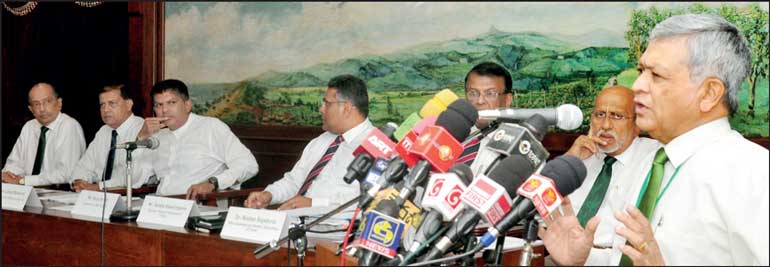Tuesday Feb 17, 2026
Tuesday Feb 17, 2026
Wednesday, 21 June 2023 00:00 - - {{hitsCtrl.values.hits}}

Sri Lanka Tea Board Chairman Niraj de Mel addresses the special industry briefing to the media. – Pic by Sameera Wijeisnghe
The tea industry is bracing for a cautious second half with improvement in crop but downward pressure on prices as well as exports.
Sri Lanka Tea Board Chairman Niraj de Mel told journalists yesterday at an industry briefing that production which sank to lowest in 26 years last year, has picked up from April onwards with application of fertiliser kicking in. By the end of May this year, the tea crop was 111.09 million kilos down by 1.73 million kilos from a year ago.
However de Mel said as per Tea Board and Tea Research Institute forecasts full 2023 year production will improve to 265-270 million kilos from 251.8 million kilos in 2022.
Crop in April rose year-on-year by 1.82 million kilos to 24.72 million kilos. May, which had a spell of dry patch, saw the crop posting a marginal increase of 0.4 million kilos to 26.5 million kilos. De Mel said so far June crop looks promising.
However, the Tea Board Chief said on the flip side that with improved supply there is pressure on the prices. Additionally, the recession in the western world has dampened buying power of major Middle Eastern tea markets which also faces slack demand during summer.
de Mel noted there was a silver lining of higher shipments to former major market Iran under the special tea-oil agreement between the two countries. In lieu of $ 250 million longstanding due to Iran for its past oil shipments to Sri Lanka, tea equivalent to that value will be shipped.
"The plan is to send $ 5 million worth of tea monthly but the scheme will kick off with $ 2 million initially," de Mel said.
Volume of tea exports in 2022 declined to 250 million kilos worth $ 1.26 billion from 286 million kilos worth $ 1.32 billion in 2021 in tandem with a plunge in crop. In the first five months of this year, exports amounted to 91 million kilos worth $ 500 million or Rs. 176 billion. In last year’s first five months exports amounted to 102 million kilos worth Rs. 122 billion.
The FOB price per kilo by end May 2023 was Rs. 1,942 as against Rs. 1,643 in the full year of 2022. In US$ terms it was $ 5.77 per kilo by end May 2023 as against $ 5.03 end of last year. de Mel doubted continuity of the same average going forward.
“Marketability of tea is key for sustainability of the industry and livelihoods,” de Mel said, adding that the country continues to face the challenge of having the highest cost of tea production in the world whilst front-end pricing depends on demand and supply dynamics.
Colombo Brokers Association Chairman Anil Cook said that drop in National Sales Average (NSA) for tea was a concern. He said year to date, it has dropped by 34% in Rupee terms and by 11% in dollar terms. The drop was linked to the appreciation of the Rupee whilst in recent weeks the volatility in the exchange rate has raised fresh concerns.
“It is a case different rates in the morning at the start of the auction and at the end in afternoon,” Cook said reflecting the concern over the uncertainty.
